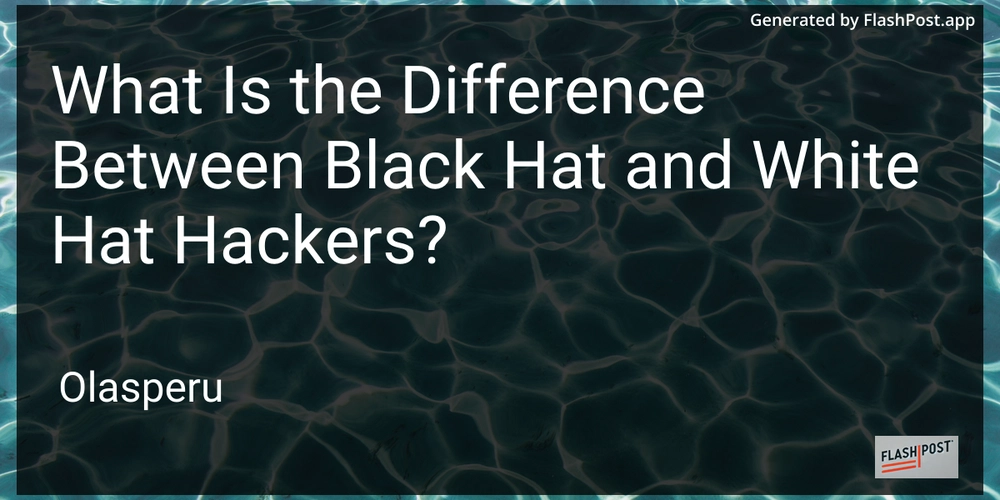What Is the Difference Between Black Hat and White Hat Hackers?
In the realm of cybersecurity, understanding the distinction between black hat and white hat hackers is crucial. At the core, both types of hackers possess advanced computer skills. However, their intentions and the ethical boundaries they adhere to distinguish them significantly. This article delves into these differences, providing clarity for both cybersecurity enthusiasts and professionals. What are Black Hat Hackers? Black hat hackers are individuals who engage in cyber activities with malicious intent. They often break into networks, steal data, and wreak havoc in the digital world, employing their skills unlawful for personal gain. Black hat activities are illegal and can lead to severe penalties if the hackers are caught. These hackers target vulnerabilities in systems, exploiting them to deploy malware, steal sensitive information, or disrupt services. Characteristics of Black Hat Hackers: Intent: They usually aim for personal gain, profit, or to cause damage. Activities: Includes data theft, spreading malware, and system disruption. Ethics: They operate outside ethical boundaries and legal frameworks. Legality: Their actions are illegal and punishable by law. What are White Hat Hackers? In contrast, white hat hackers use their skills ethically and legally. Often referred to as "ethical hackers," these individuals help organizations protect their systems from cyber threats. White hat hackers are usually employed by companies or work as independent consultants, performing tasks like penetration testing to identify and resolve security vulnerabilities. Characteristics of White Hat Hackers: Intent: Aim to improve security and protect against malicious attacks. Activities: Includes conducting security assessments, penetration testing, and developing security strategies. Ethics: Adheres to ethical guidelines and operates within legal constraints. Legality: Their actions are legal and often regarded positively within the cybersecurity community. The Grey Area: Grey Hat Hackers It's also worth mentioning grey hat hackers, who fall somewhere in between black and white hats. They might exploit vulnerabilities without permission but not for malicious intent, often informing the organization afterward in hopes of a reward or recognition. Why Does This Distinction Matter? Understanding these differences is vital for companies aiming to bolster their security. Employing white hat hackers can protect against the malicious intent of black hat hackers. Additionally, for those pursuing a career in cybersecurity, knowing the ethical implications and legal frameworks is essential. Explore a Career in Cybersecurity For those interested in pursuing a career in this field, there are several resources available to get started: Interested in learning penetration testing? Explore comprehensive cybersecurity training to gain hands-on skills. Looking for a job in cybersecurity? Discover tips on finding cybersecurity analyst positions. Preparing for a job interview? Learn how to excel in a cybersecurity analyst interview. In the rapidly evolving landscape of cybersecurity, distinguishing between black hat and white hat hackers is more than just an academic exercise—it's a key component of maintaining robust security operations. Understanding these roles helps organizations defend against breaches and ensures a safer digital environment for everyone.

In the realm of cybersecurity, understanding the distinction between black hat and white hat hackers is crucial. At the core, both types of hackers possess advanced computer skills. However, their intentions and the ethical boundaries they adhere to distinguish them significantly. This article delves into these differences, providing clarity for both cybersecurity enthusiasts and professionals.
What are Black Hat Hackers?
Black hat hackers are individuals who engage in cyber activities with malicious intent. They often break into networks, steal data, and wreak havoc in the digital world, employing their skills unlawful for personal gain. Black hat activities are illegal and can lead to severe penalties if the hackers are caught. These hackers target vulnerabilities in systems, exploiting them to deploy malware, steal sensitive information, or disrupt services.
Characteristics of Black Hat Hackers:
- Intent: They usually aim for personal gain, profit, or to cause damage.
- Activities: Includes data theft, spreading malware, and system disruption.
- Ethics: They operate outside ethical boundaries and legal frameworks.
- Legality: Their actions are illegal and punishable by law.
What are White Hat Hackers?
In contrast, white hat hackers use their skills ethically and legally. Often referred to as "ethical hackers," these individuals help organizations protect their systems from cyber threats. White hat hackers are usually employed by companies or work as independent consultants, performing tasks like penetration testing to identify and resolve security vulnerabilities.
Characteristics of White Hat Hackers:
- Intent: Aim to improve security and protect against malicious attacks.
- Activities: Includes conducting security assessments, penetration testing, and developing security strategies.
- Ethics: Adheres to ethical guidelines and operates within legal constraints.
- Legality: Their actions are legal and often regarded positively within the cybersecurity community.
The Grey Area: Grey Hat Hackers
It's also worth mentioning grey hat hackers, who fall somewhere in between black and white hats. They might exploit vulnerabilities without permission but not for malicious intent, often informing the organization afterward in hopes of a reward or recognition.
Why Does This Distinction Matter?
Understanding these differences is vital for companies aiming to bolster their security. Employing white hat hackers can protect against the malicious intent of black hat hackers. Additionally, for those pursuing a career in cybersecurity, knowing the ethical implications and legal frameworks is essential.
Explore a Career in Cybersecurity
For those interested in pursuing a career in this field, there are several resources available to get started:
- Interested in learning penetration testing? Explore comprehensive cybersecurity training to gain hands-on skills.
- Looking for a job in cybersecurity? Discover tips on finding cybersecurity analyst positions.
- Preparing for a job interview? Learn how to excel in a cybersecurity analyst interview.
In the rapidly evolving landscape of cybersecurity, distinguishing between black hat and white hat hackers is more than just an academic exercise—it's a key component of maintaining robust security operations. Understanding these roles helps organizations defend against breaches and ensures a safer digital environment for everyone.











































































































































































![[The AI Show Episode 142]: ChatGPT’s New Image Generator, Studio Ghibli Craze and Backlash, Gemini 2.5, OpenAI Academy, 4o Updates, Vibe Marketing & xAI Acquires X](https://www.marketingaiinstitute.com/hubfs/ep%20142%20cover.png)




























































































































![[DEALS] The Premium Learn to Code Certification Bundle (97% off) & Other Deals Up To 98% Off – Offers End Soon!](https://www.javacodegeeks.com/wp-content/uploads/2012/12/jcg-logo.jpg)


![From drop-out to software architect with Jason Lengstorf [Podcast #167]](https://cdn.hashnode.com/res/hashnode/image/upload/v1743796461357/f3d19cd7-e6f5-4d7c-8bfc-eb974bc8da68.png?#)








































































































.png?#)

































_Christophe_Coat_Alamy.jpg?#)
 (1).webp?#)





































































































![Apple Considers Delaying Smart Home Hub Until 2026 [Gurman]](https://www.iclarified.com/images/news/96946/96946/96946-640.jpg)
![iPhone 17 Pro Won't Feature Two-Toned Back [Gurman]](https://www.iclarified.com/images/news/96944/96944/96944-640.jpg)
![Tariffs Threaten Apple's $999 iPhone Price Point in the U.S. [Gurman]](https://www.iclarified.com/images/news/96943/96943/96943-640.jpg)




































































































































